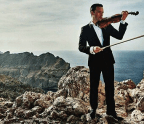

Whether simply a tale of demigods, dwarves and dragons or a deeply symbolic work, Wagner’s Ring cycle has had a profound impact on both arts and politics since its 1876 premiere. Terry Blain relates the history of the work’s composition, stagings and recordings, and considers its legacy
On the afternoon of 5 September 1853, Richard Wagner slumped exhausted on a couch at his hotel in La Spezia, Italy, where he had gone for mental and musical recuperation. Restless and feverish the night before, he had set out on a long walk in the hills that morning, hoping that a period of deep, restful sleep might follow. It didn’t. Instead Wagner ‘slipped into a kind of drowsy state’, suddenly feeling as though he were ‘sinking into swiftly flowing water’. From its rushing noise the chord of E flat major emerged ‘in broken forms’, transforming into ‘increasingly animated melodic figurations’.

IMAGINING ‘THE WAVES WERE rushing high above my head’, Wagner woke ‘in sudden terror’ from his dream. He immediately knew that something momentous had happened. ‘I at once recognised,’ he later wrote, ‘that the orchestral prelude to Rheingold, which I had been carrying within me without being able to precisely locate it, had finally risen to the surface.’
The sounds that Wagner heard in his state of semi-slumber eventually became the opening of his epic, four-opera cycle – yet they were mere snippets compared to the mammoth task that lay ahead. Four full-length operatic librettos, written by Wagner himself, sat waiting for as a starting-point, involved a sweeping analysis of human history, from prelapsarian innocence to the rapacious power struggles and despoliation of nature which Wagner saw in the 19th-century world around him.




